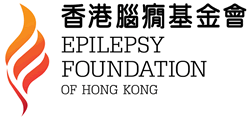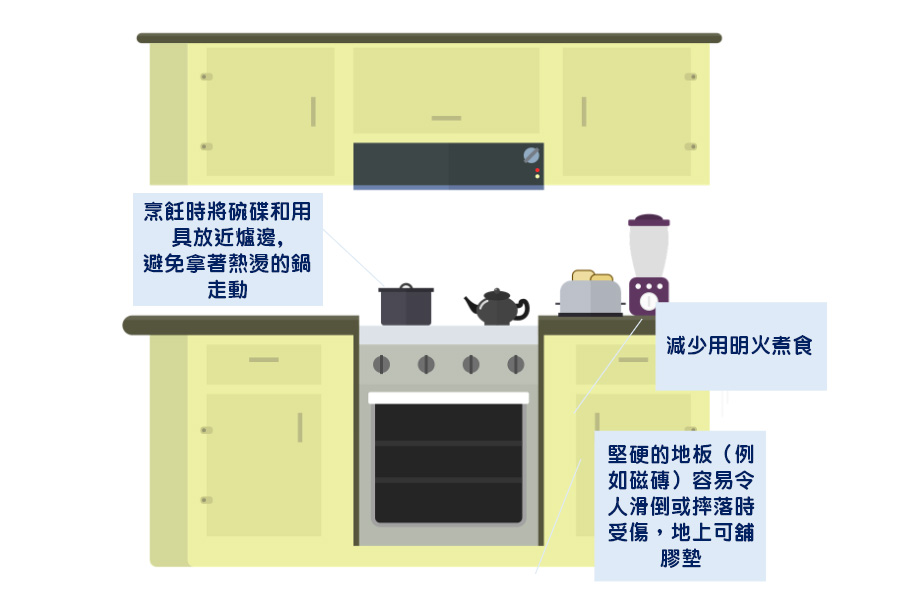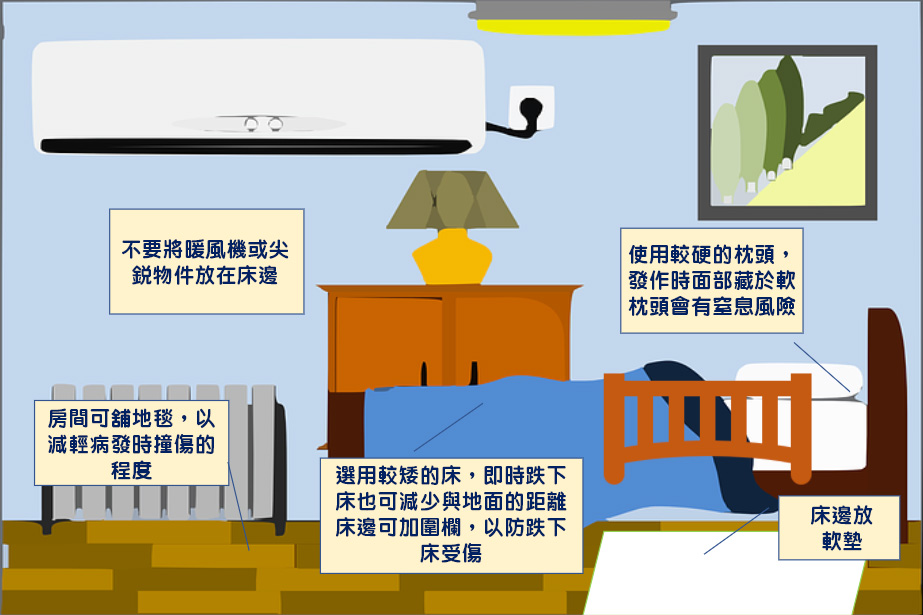Self-Management of Persons with Epilepsy
| DO | DON’T |
|---|---|
|
|
Epilepsy medications can effectively control seizures. The prescription for a person with epilepsy counts on her/his weight and physical conditions. The dosage varies with individuals and the doctor needs time to adjust medications and dosage for an individual patient. Be it an increase or reduction in the dosage, one must change it gradually so as to minimise the side effects and avoid seizure triggers.
Tips
- In any event of forgetting to take medicines, the patient must take the missed dose within 24 hours.
- You should continue to take your prescribed epilepsy medications even if you got a flu/cold
- Some epilepsy medications have slight side effects such as drowsiness. Adjustment of the dosage can help alleviate these effects.
- If you do not feel well after taking medications, inform your doctor and don’t stop the medications without medical instruction
- The efficacy of alternative treatments, for example, acupuncture, hypnosis, vitamin supplements or Chinese medicine herbs are yet to be affirmed. If you choose to receive any of these treatments, you must continue your prescribed epilepsy medications
The side effects of epilepsy medications
Some of theepilepsy medications may cause side effects (see table), such as drowsiness. Proper adjustment of the dosags can help alleviate the side effects. If you do not feel well after taking medications, you should tell your doctor and don’t stop taking the medications on your own.
顯示圖表
| 藥物 | 較常見的副作用 | 罕見副作用 | 非常罕見的副作用 |
|---|---|---|---|
| 卡馬西平 Carbamazepine (Tegretol®) | 頭暈、噁心 視覺模糊 腸胃不適、低血鈉症、新服用此藥前應檢驗是否有HLA*B1502基因 | 肝損害、躁鬱症 | 皮膚出疹、再生障礙性貧血、Stevens-Johnson綜合症、嚴重過敏反應 |
| 服利寧 Clobazam (Frisium®) | 疲倦、流口水、便秘、咳嗽、失眠、暴躁、藥物依賴性 | ||
| 氯硝西泮 Clonazepam (Rivotril®) | 疲倦、活動不平衡、抑鬱、藥物依賴性、記憶障礙 | 過度活躍(常見於兒童) | 白血球偏低 |
| 加巴噴丁(善痛眠) Gabapentin (Neurontin®) | 嗜睡、頭暈、複視、善忘、語言障礙、手震、精神緊張 | 體重下降、視力問題 | 感覺異常 |
| 拉莫三嗪(利必通) Lamotrigine (Lamictal®) | 失眠、頭暈、皮膚出疹 | 複視、視力模糊、頭痛、肝酵素失調、Stevens-Johnson綜合症、結膜炎 | 肝衰竭 |
| 左乙拉西坦開普蘭 Levetiracetam (Keppra®) | 困倦、乏力、頭暈、情緒困擾 | 運動失調、血小板偏低 | 肝酵素失調 |
| 奧卡西平 Oxcarbazepine (Trileptal®) | 困倦、手震、運動失調、複視、頭暈、噁心、腸胃不適、低血鈉症 | 肝損害、躁鬱症 | 皮膚出疹、再生障礙性貧血、Stevens-Johnson綜合症、嚴重過反應 |
| 苯巴比通 Phenobarbital (Luminal®) | 疲勞、嗜睡、失眠、抑鬱、注意力渙散、記憶力下降、易怒、焦慮 | 皮膚粗糙、性慾下降、焦慮症、失眠 | 中毒性表皮溶解症、皮膚出疹、肝損害 |
| 苯妥英鈉 Phenytoin (Dilantin®) | 運動失調、震顫、壓厭食、噁心、嘔吐、頭暈、皮膚出疹、牙齦增生、面部粗糙、多毛 | 皮膚粉刺、骨質疏鬆、性慾減低、缺乏維他命K和葉酸 | 周邊神經病變、Stevens-Johnson綜合症、肝損害 |
| 普加巴林 (利痛抑) Pregabalin (Lyrica®) | 腸胃不適、嗜睡、頭暈、複視、性慾減低、疲勞 | 幻覺、貧血、皮膚乾燥 | 嚴重過敏反應、步態異常、體重上升 |
| 托吡酯 (妥泰) Topiramate (Topamax®) | 體重下降、食慾不振、情緒不穩、語言障礙 | 腎結石、運動失調、記憶障礙、乏汗(常見於兒童) | 青光眼 |
| 丙戊酸鈉 Valproate (Epilim®) | 腸胃不適、噁心、脫髮、胃口增加、體重上升、情緒紊亂、肝酵素失調 | 血小板偏低、躁狂、過度活躍、肝衰竭 | 腦病 |
Women with epilepsy shall consult a doctor before getting pregnant. Good planning on pregnancy will ensure health of both the mother and the baby.
They should attend medical consultation and follow-ups to work together with their doctor throughout the pregnancy period. The doctor will help the would-be mother to minimise of the types and dosage of the epilepsy medications. It is important to seek doctor’s advice before breastfeeding.
Epileptic seizures are mostly unpredictable. Some of the patients who have frequent seizures may get injured as they lost consciousness that leads to a fallout or hitting an object. Hence it is essential to reduce the potential hazards and ensure safety at home by modifying home environment and incorporating protective measures.
Environment
- Hard floor materials can be slippery. Place a non-slip matt or soft carpet on the floor.
Furniture and houseware
- Covering sharp angles or edges of tables and furniture with soft materials.
- Using tempered glass on windows and doors, and sticking safety tapes on glass so as to minimize/ confine/contain the spread of debris in any event of the glass being broken.
- Avoiding use of furniture with glass which is dangerous in a smash
- Installing a timer on the socket when using a heating device (e.g. fan, iron). The automatic switch-off will prevent the user from heat burns in seizures.
- TV: those with photosensitive epilepsy are advised to keep at least 3 metres from the TV set when watching TV.
- Medicine: keep medicine out of children’s reach
Bathroom
- Shower is safer than bathing, with a lower risk of drowning
- Avoiding accumulation of water on the floor to prevent slipping
- Using constant temperature system to reduce burn risks
- Using bathroom door that allows opening from the outside for emergency rescue
Floor, bed and pillow
- Placing pads on the floor beside the bed in case you roll out of bed
- Putting up fences on both sides of the bed to prevent risk of falling out of bed.
- Use a harder pillow
Those who have frequent epileptic seizures are advised to bring along their medical records or medical certificate which set out the diagnosis and prescribed medications. The practice will help in if seizures occur.
It is a requirement to report epilepsy to the Transport Department when applying for a driving licence. The law states that persons with epilepsy are not eligible to apply for a driving licence in Hong Kong.
Positive Living
- A person with epilepsy can enjoy good leisure time and social life, just like what others do, for example making handicraft and doing exercise. Yet a person with epilepsy is advised to have the companion of friends when go swimming or hiking.
- Telling your relatives or co-workers about your epilepsy and the ways to handle seizures. In any event of occurrence of an epileptic seizure, they can provide you with the appropriate assistance.
- It is important to lead a normal social life
- Bringing along sufficient medications and the medical certificate when travelling




